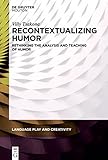Recontextualizing Humor : Rethinking the Analysis and Teaching of Humor / Villy Tsakona.
Material type: TextSeries: Language Play and Creativity [LPC] ; 4Publisher: Berlin ; Boston : De Gruyter Mouton, [2020]Copyright date: ©2020Description: 1 online resource (XVI, 229 p.)Content type:
TextSeries: Language Play and Creativity [LPC] ; 4Publisher: Berlin ; Boston : De Gruyter Mouton, [2020]Copyright date: ©2020Description: 1 online resource (XVI, 229 p.)Content type: - 9781501517488
- 9781501511523
- 9781501511929
- 418.0071 23/eng/20230216
- online - DeGruyter
- Issued also in print.
| Item type | Current library | Call number | URL | Status | Notes | Barcode | |
|---|---|---|---|---|---|---|---|
 eBook
eBook
|
Biblioteca "Angelicum" Pont. Univ. S.Tommaso d'Aquino Nuvola online | online - DeGruyter (Browse shelf(Opens below)) | Online access | Not for loan (Accesso limitato) | Accesso per gli utenti autorizzati / Access for authorized users | (dgr)9781501511929 |
Frontmatter -- Acknowledgments -- Contents -- List of Tables -- List of Figures -- Transcription conventions for the Greek oral data and its translation -- Introduction -- 1. Context in humor research -- 2. Humor and metapragmatics -- 3. Genres with/and humor -- 4. Towards a “contextualized” theory of humor -- 5. Teaching about humor within a critical literacy framework -- 6. Conclusions -- References -- Subject Index -- Author Index
restricted access online access with authorization star
http://purl.org/coar/access_right/c_16ec
Humor may surface in numerous and diverse contexts, which at the same time determine how humor works, its form, and its functions and consequences for interlocutors. Adopting a sociolinguistic and discourse analytic perspective, this study is aligned with approaches to humor exploring the variety of humorous genres, the wide range of sociopragmatic functions of humor, and the more or less dissimilar perceptions speakers may have concerning what humor is, what it means, and how it works. The chapters of this book propose a new theoretical approach to the analysis of humor by bringing context into focus. Furthermore, the study explores how we can teach about humor within a critical literacy framework creating classroom space for everyday humorous texts that are part of students’ social realities, and simultaneously taking into account that humor may yield multiple, disparaging, and often conflicting interpretations. This book is intended to appeal to humor researchers from various disciplines (such as linguistics, media studies, cultural studies, literary studies, sociology, anthropology, folklore) as well as to professionals or researchers in education.
Issued also in print.
Mode of access: Internet via World Wide Web.
In English.
Description based on online resource; title from PDF title page (publisher's Web site, viewed 25. Jun 2024)


